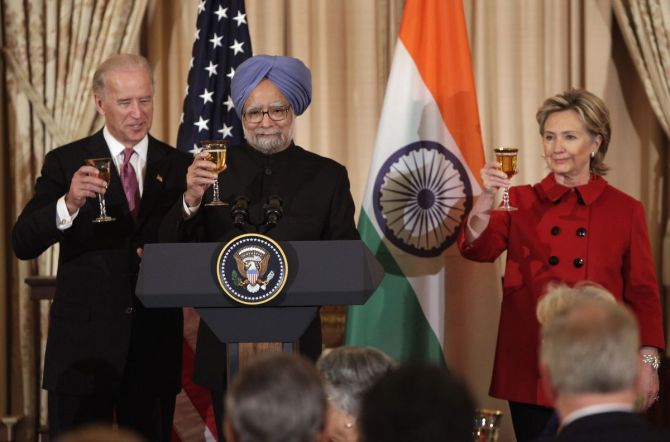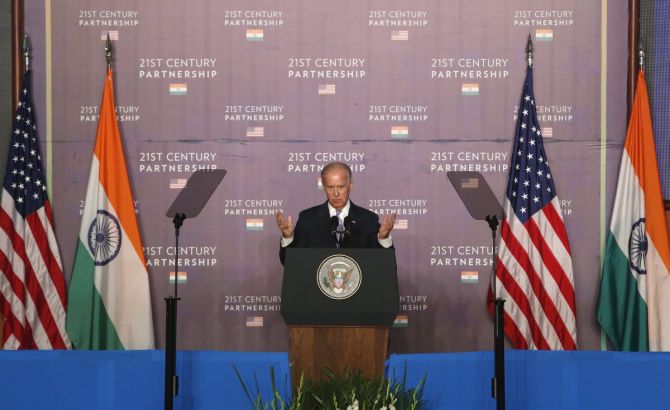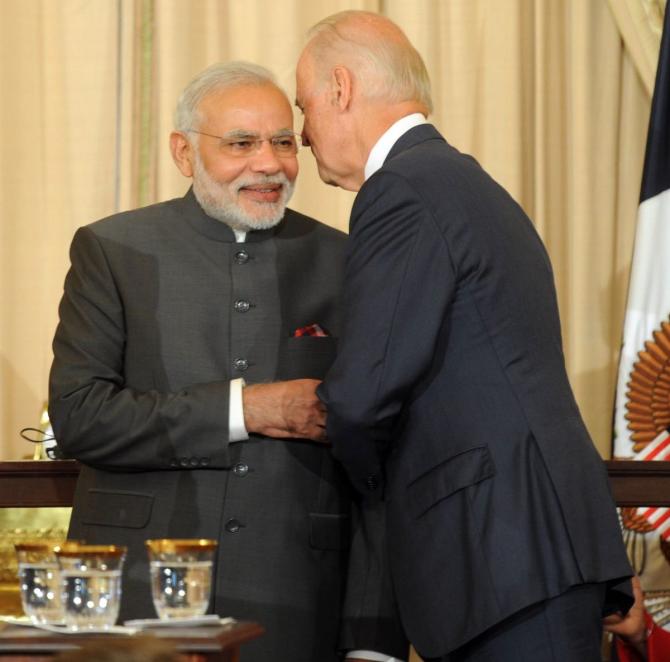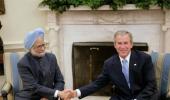''I would urge my Indian friends to look at how significant the overall support was.'

This interview was first published on Rediff.com on December 4, 2006.
Senator Joseph Biden, the ranking Democrat on the powerful Senate Foreign Relations Committee, was the driving force behind the Senate's overwhelming adoption on November 16, 2006 -- by a margin of 85 for to 12 against -- of the enabling legislation (S. 3709) to facilitate the US-India civilian nuclear agreement he co-authored with the Committee's Republican chairman, Senator Richard Lugar of Indiana.
In an exclusive interview with Rediff India Abroad Managing Editor Aziz Haniffa, Biden provides an inside view of the behind-the-scenes negotiations before the Senate vote, the concerns over some amendments, and his optimism that the House-Senate conference to reconcile both bills will not pose a problem.
Were you surprised by the huge margin of votes in favour of the bill?
No, I wasn't. Not at all. I had worked on it very hard.
I had been talking with my colleagues for the previous month and I had worked out an agreement where even those who had amendments, who didn't like it (the bill), were not going to delay it.
Initially my concern was that the Republican leadership was playing a game of not bringing it up, so that they could play the blame game and I was worried that several Democrats might join in and take the opportunity to kill the treaty.
So I spent a great deal of time with those Democrats and Republicans who had amendments that were in opposition to the treaty -- the so-called killer amendments -- and I was confident by this time last week (a week before the bill was taken up on the Senate floor) that I had it worked out.
So when Senators [Jeff] Bingaman, [Byron] Dorgan, [Russ] Feingold, and [Barbara] Boxer brought in their amendments, you were anticipating them, despite all your negotiations with them?
Yes, I was anticipating those, but I had got an agreement from them that they would not use all the parliamentary tactics available to them to slow this down.
If you noticed, each of those amendments were offered very swiftly -- they were not delayed and so I was quite sure that I had the votes.
The most difficult vote was when I had to go into secret session to take on a killer amendment offered by the Republicans -- specifically by the Senator from Nevada, [John] Ensign.
Because it was a secret session, I did not want to discuss it.
[But] it's rare, as you know, for the Senate to go into a secret session [during a floor debate and vote], and we spent an hour and 20 minutes there.
When we went into that meeting, I didn't think we had the votes to defeat it, but I argued the point for about an hour and 10 minutes.
I was pleasantly surprised [to see it defeated].
I was also pleasantly surprised by the size of the margin [by which] the Boxer amendment on Iran [was defeated].
I was confident we would beat all the other ones -- and I thought we could beat all Boxer too -- [but] I wasn't at all sure about the one that was a surprise to me -- the amendments offered by the Senator from Nevada, Ensign.

I believe Ensign's amendment had to do with the Additional Protocol, but did this have any relevance to the enabling legislation to facilitate the nuclear deal? Wasn't the only concern that Ensign had put the bill on hold and threatened not to allow it to come on the floor unless the Additional Protocol was removed from the bill?
Well, it did have to do with the Additional Protocol.
But had his amendment been attached to the legislation, India would not have been able to accept it and, I believe, it would have caused the treaty to fall apart in my view.
Didn't his amendment have something to do with not wanting International Atomic Energy Agency inspection of US facilities because he and the other conservative Republicans feared that some of these international inspection teams could include spies from unfriendly nations.
Because it was a secret session, I am not going to talk about that on the record in any detail.
You said you had reached an understanding with people like Bingaman, Dorgan, Feingold, Boxer.
The understanding I had was that, go ahead and make your case -- make the best case you can as quickly as you can but do not try to kill this by filibustering or extending the debate and give the Republican Majority Leader (Senator Bill Frist) an excuse to pull the bill down.
Because, as you recall, the hardest part of my getting it up, (Frist) kept saying that unless I could guarantee him it could be done in half a day he wouldn't bring it up.
There was no way it could be done in half a day but I was worried that it might take three or four days.
So I worked very hard with my Democratic colleagues and they know how much I cared about this and they believed I had the votes -- that four of them basically said, 'OK, we'll make our case straight-forwardly and if you beat us we'll go away.
' So that's what we did and that's why we picked an important amendment first to demonstrate we could beat it -- so that it would build momentum.
I was not surprised by the final outcome.
The only two votes that surprised me in terms of the extent of support we got was on the Ensign Amendment and the Boxer Amendment relating to Iran.
Did Bingaman, Dorgan and Feingold -- who were trying to get India to stop producing fissile material if the US provided it with nuclear fuel and nuclear technology -- see that they did not have the votes to push their amendments through?
I do. I think they saw the fact that I had the votes and therefore they would... And also, you know, one of the things is that I have been leading the foreign policy fight for the Democrats for a long time and they had no interest in doing any harm to a position I'd taken.
In other words, there is a sense of collegiality - that they knew how important I thought it was.

The Boxer Amendment scared a lot of people both in the Indian-American community and the pro-India lobby in business and industry. They saw it as seeking a Presidential certification that India does not have military relations with Iran, which the US sees as a pariah, if India was deemed an exception to the Atomic Energy Act and supplied it with nuclear fuel and technology.
Were you and others who were fighting for the bill afraid this was the mother of all killer amendments, one that could actually bring the bill down? Also, is the Iran bogey going to haunt this deal?
As I said earlier, I knew we could defeat the Boxer Amendment, but what surprised me was the margin we had against it.
But, oh yes, it will (Iran will continue to haunt US-India relations).
If, God forbid, India decided it was in its interests to reach a more robust military agreement with Iran, that would be enough to ruin the relationship notwithstanding this agreement and everything else.
That would sour things very much.
(But) I don't expect that to happen.
India has been good, as I pointed out in the debate.
In both the IAEA board of governors and the United Nations Security Council, India joined us on the nuclear side (along with the European Community to isolate Iran for its alleged clandestine nuclear weapons programme).
And, as I pointed out, there's absolutely no evidence that India has transferred any technology and/or lethal weapons to Iran.
Also, there is no evidence that they've transferred any military capability that allows the government in Tehran to support terrorism.
If they did, it would be very difficult.
Isn't India's relationship with Iran going to create some problems in the conference? Even Congressman Tom Lantos -- the co-author of the legislation and the driving force behind the House bill being approved so overwhelmingly -- simply goes ballistic when the slightest possible cooperation between India and Iran is brought to his attention?
Since we defeated the (Boxer) Amendment handily in the Senate, I do not think I am going to have to accept any amendment relating to Iran (in conference).
There is one amendment we accepted on Iran (the Senator Tom Harkin amendment that India would help the US isolate Iran for its alleged clandestine uranium enrichment programme in defiance of its Non-Proliferation Treaty obligation).
We believe we can make it better in committee and it would not be a killer amendment.
But the Boxer Amendment, for a lot of complicated reasons, would have been a killer amendment.
Nicholas Burns (the under secretary of state for political affairs and chief US negotiator of the US-India deal) told a bunch of us that the administration is extremely pleased with the overwhelming passage of the Senate bill and that both the House and Senate bills conform to the agreement the administration negotiated with the Indians.
But India is having problems with parts of the Senate legislation, particularly vis-a-vis some of the required Presidential certifications, etc. Is this is the best we've got? Has India just got to live with this and not make waves?
It's not only the best we've got, I think it's good. There is nothing material in that legislation that should cause the Indians, other than for political reasons, to have any concern about the ratification.
I think we've been able to stitch together this overwhelming support.
I would urge my Indian friends to look at how significant the overall support was.
Three months ago, I made the point very strongly that, from a tactical standpoint, it will be much better to have this vote so overwhelming with the language we now have than have even better language with 51 votes.
This is a process. This is a process of reconstructing almost from scratch, building a relationship with that important nation in the world, India.
For us, that is just going to have to be built constantly on confidence building measures. This is a critical piece of that.
Part 2: 'My dream is that the two closest nations in the world will be India and the United States'










